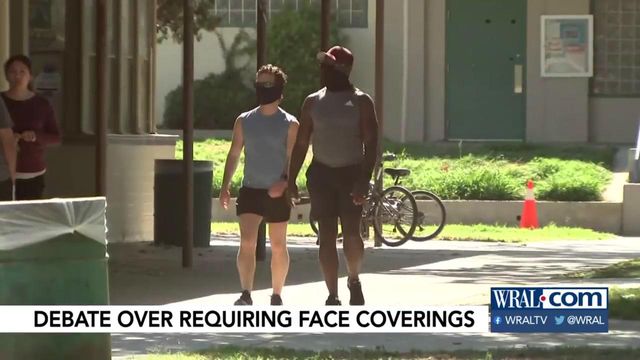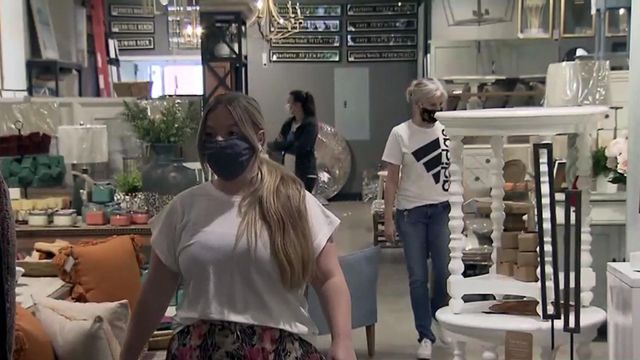NC, Wake, Raleigh officials weighing whether to make masks mandatory in public
Noting that North Carolina's coronavirus case count continues to rise, Gov. Roy Cooper said Monday that requiring people to wear masks in public to limit the spread of the virus is "absolutely in discussion."
Posted — UpdatedWake County commissioners also are considering such a mandate, and the Raleigh City Council plans to vote Tuesday on requiring masks.
"We want people to voluntarily to do this, but we are looking at additional rules to potentially make these mandatory," Cooper said at a news conference.
Wake County commissioners discussed a mask requirement during their Monday afternoon meeting. Chairman Greg Ford said logistics, enforcement and getting all 15 mayors in the county on board are the main concerns that need to be addressed.
"It goes beyond being a personal responsibility thing," Ford said. "It is a public courtesy, in my opinion."
"We feel we need to revisit this issue with COVID cases increasing. We feel this has become a public safety issue,” Baldwin said.
More than 45,250 statewide have been infected with coronavirus since early March, but state officials estimate that about 29,200 of those have since recovered. About 800 people remain hospitalized with COVID-19, the illness associated with the virus, and another 1,173 people have died.
The rolling, seven-day average shows 1,231 new infections have been reported in North Carolina each day for the past week, which is an all-time high for the state. The state has rapidly expanded virus testing in recent weeks, but the percentage of positive tests has ranged between 8 and 10 percent since the beginning of June – higher than the 7 percent mark usually seen in May.
Dr. David Wohl, an infectious disease specialist at the UNC School of Medicine, said the caseload will likely continue to grow for weeks.
"We haven’t even seen the full effect of everything that’s slowly reopening, mass gatherings, Memorial Day weekend," Wohl said. "What were seeing is a much more prolonged increase in cases, and it’s stretched out."
Councilman Jonathan Melton said he supports mandating masks in Raleigh. He acknowledged it’s hard to wear a mask when eating or drinking, but he said masks could be used when people are waiting in line or using a public restroom.
"I don’t want to go back to stay-at-home order," Melton said. "Whatever we can do to keep people safe, I am in favor of doing it."
Wake County resident Kendrick Ruffin said he would be in favor of a local mask mandate.
"I don’t want to get sick and us get shut down again, so I feel like it’s the perfect time to keep these on," Ruffin said.
"I’m not putting on a mask unless someone around me is uncomfortable," resident India Adams said. "I don’t mind compromising, but again, that’s having an option."
Dr. Mandy Cohen, secretary of the state Department of Health and Human Services, said recent studies have shown that masks are really effective at curbing the virus when a majority of people wear them.
"It's why we keep harping on the three W's and saying that we can do this together," Cohen said, referring to the mantra state officials have taken up during the pandemic of wearing masks, waiting at least 6 feet apart from others and washing hands frequently.
"I know folks want to move forward with additional openings and want to get back to activities," she added. "This is the way to do it, to focus on these collective actions we can do. ... The science is becoming pretty powerful to say that, if we all do this together, we can truly flatten the curve and slow the spread of this virus so that we can continue to make progress."
Dr. Larry Greenblatt, one of the founders of the Covering Durham iniative to provide masks to people, said wearing masks is by far the best way to slow the spread of the virus.
"Even more important than social distancing and hand washing that are helpful as well, but nothing's better than face covering," Greenblatt said. "[The caseload] might be five times worse if people weren’t taking these kinds of measures, like not wearing face masks while they are out or while they are on the job."
Durham City Councilman mark-Anthony Middleton agreed that masks have helped reduce the number of infections in his city.
"This was not devised to be a law-enforcing issue where we have police driving around looking for folk to cite them or to fill our coffers for not wearing a mask. This ordinance really came out of love and concern," Middleton said. "This isn’t about taking away rights. This is about preserving life and keeping folks safe, and your right to express yourself is no more important than the person standing next to you at Walmart’s right to live and go home and not infect grandma or their children."
Related Topics
• Credits
Copyright 2024 by Capitol Broadcasting Company. All rights reserved. This material may not be published, broadcast, rewritten or redistributed.






